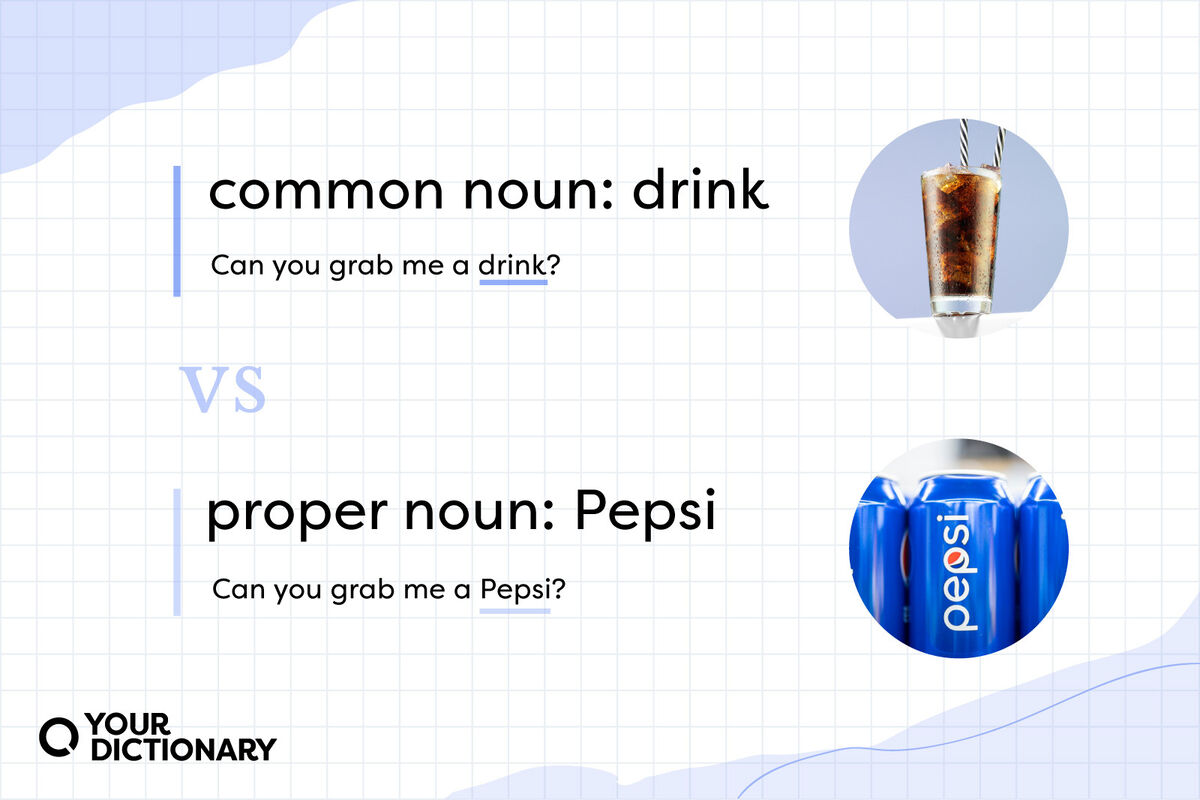
There’s a big difference between a dog and Lassie — and it’s not just Lassie’s uncanny ability to call for help. (Can your dog do that?) One is a common noun, and the other is a proper noun. The difference may look like just a capital letter, but it matters a lot more in a sentence.
What Are Common Nouns?
Common nouns are general nouns within a sentence. They’re nonspecific people, places, things, and ideas.
Examples of common nouns include:
- general people - woman, friend, student
- general places - living room, store, school
- general things - television, dog, cloud
- general ideas - friendship, love, belief
How To Use Common Nouns in a Sentence
Common nouns can be both singular and plural. You don’t capitalize common nouns because you’re not talking about a specific one (unless they’re the first word in the sentence).
- The man walked down the road.
- Cars zoomed past us on the racetrack.
- A bus pulled up to the curb.
- My dad says I can't go to the party.
- How many instruments does the woman play?
- Education is important to many people.
What Are Proper Nouns?
Proper nouns are specific people, places, things, or ideas. They include people’s names, names of places, brand names, days of the week, months of the year, and titles of published works.
Examples of proper nouns include:
- specific people - Joanna, Terrance, Dr. Rogers
- specific places - Hollywood, France, Jupiter
- specific things - Panasonic, Toyota, Doritos
- specific ideas - Christianity, Murphy’s Law, Spanish Inquisition
- calendar words - Monday, November, Valentine’s Day
- published works and movies - Lord of the Rings, Captain Underpants, Frozen
How To Use Proper Nouns in a Sentence
You use proper nouns in sentences the same way you use common nouns, but they keep their capitalization no matter where they appear in a sentence.
- Terrance walked down Second Street.
- The Toyota sat in the Grand Valley parking ramp.
- We landed at the Detroit International Airport.
- Shelby is a good friend of mine.
- He rode the Kawasaki Teryx to Meachum Junior High.
- Mom saw the Beatles in concert.
Common Nouns vs. Proper Nouns
While looking for capital letters is a good strategy, common nouns can be capitalized when they’re the first word in a sentence — so you really need to know whether the noun in question is generic (a girl) or specific (Mary).
|
Type |
Common Noun |
Proper Noun |
|
person |
girl |
Sheila |
|
teacher |
Mr. Sanderson |
|
|
president |
Abraham Lincoln |
|
|
place |
street |
Brooklyn Avenue |
|
grocery store |
Vons |
|
|
university |
University of Chicago |
|
|
thing |
guitar |
Fender |
|
car |
Honda |
|
|
document |
Declaration of Independence |
|
|
idea |
religion |
Christianity |
|
war |
World War I |
|
|
law |
Americans with Disabilities Act |
How To Turn Common Nouns Into Proper Nouns
If you know the specific name of the noun in a sentence, you can change common nouns to proper nouns easily. You don’t need to change the verb in the sentence for subject-verb agreement.
Common nouns often use determiners or adjectives that provide more information. You can move or remove those words when you use a proper noun, since there’s only one of them.
- How old is the boy? (boy is a common noun)
- How old is Jerry? (Jerry is a proper noun; remove the article the)
- We traveled to another country this summer. (country is a common noun)
- We traveled to Guatemala this summer. (Guatemala is a proper noun; remove the determiner another)
- I finished reading a great book yesterday. (book is a common noun)
- I finished reading Harry Potter yesterday. (Harry Potter is a proper noun; remove the adjective great)
- Did you bring any soda to the party? (soda is a common noun)
- Did you bring any Diet Coke to the party? (Diet Coke is a proper noun; you can keep or remove the determiner any)
Are Family Names Common Nouns or Proper Nouns?
Family names (mom, dad, grandma, uncle) are common nouns when you're not using them as names. If you're using a determiner or possessive adjective in front of them, they're definitely common nouns and shouldn't be capitalized.
- My mom works at the hospital.
- The baby's dad stays home with him.
- Your grandma is really nice.
- Does his uncle live with him?
However, family names are proper nouns when you use them as names (Mom, Grandma, Uncle Rob).
- Mom works at the hospital.
- Dad stays home with the baby.
- Grandma Rose is really nice.
- Does Uncle Pete live with him?
Do You Capitalize Common Nouns With Proper Adjectives?
Knowing the difference between common nouns and proper nouns is helpful — but do the rules change when you use proper adjectives? Proper adjectives come from proper nouns, and they modify common nouns.
Examples of proper adjectives include:
- Catholic (from proper noun Catholicism)
- American (from proper noun America)
- Shakespearean (from proper noun Shakespeare)
- African (from proper noun Africa)
- Texan (from proper noun Texas)
When you modify a common noun with a proper adjective, don’t capitalize the common noun. You’d say American citizen, not American Citizen, since there’s more than one American citizen. The same goes for phrases like Texas barbecue or African music.